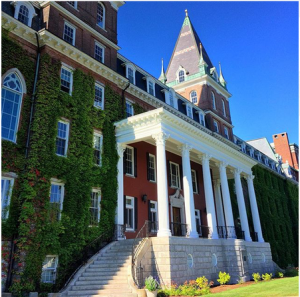It doesn’t take more than a quick peek at the weather forecast to see that it is definitely still summer. Even though I am currently planning my fall travel (flights! hotels! high school visits! college fairs!) and casting my thoughts to the months ahead, we admission counselors in the office are keeping busy with summer activities as well.
One summer activity of note is our July Advisory Day Program. If you have not been following us on Twitter, July Advisory Days occurs every Monday, Wednesday, and Friday of this month. On these afternoons, we offer tours and info sessions as always but also add a short session on how to plan for the college interview and how to write the Common App college essay–not to mention we serve cookies from the dining hall as an afternoon pick-me-up.
With only two JADs left in the season, it has been a busy month! For those who are not able to visit campus and attend the program, I wanted to mention a few highlights about the interview portion of JAD. Later this week I will discuss some of the takeaways of the essay part of the program!
1. Plan ahead–some institutions offer interviews, others do not. It is worth a quick look on the college’s website to see their policy. If it is an option, why not take that opportunity to distinguish yourself as an applicant? Furthermore, do your homework. Look into the school a little and think of some questions that you might want to ask your interviewer. It will show that you are serious about applying.
2. Be mindful of time, attire, and your overall demeanor. The interview is the chance to give the admissions office an impression of who you are and how you might fit into the campus community. Try to arrive early, dress to impress (leave the t-shirts, shorts, and flip flops for another day), and be the friendly, polite, excited applicant that you are. We are happy to meet you and want to see you put your best foot forward!
3. Remember that although it is an evaluative interview here at Holy Cross, it is also a conversation between two people. We in admissions want to know more about you, so we are not going to throw any curve balls at you or try to put you on the spot. Really, the interview serves as a way for us to add a face and personality to your application, and as such, we just want to hear your story.
I hope this helps! Please stay tuned for the post on the Common App essay coming up later this week.
(photos by Xiaofeng Wan)






 Well what are you waiting for?! There are still lots of opportunities to have a personal interview through the admissions office. Holy Cross offers interviews until December 30th. Early decision candidates- your interview deadline is November 25th. So get on the phone and give us a call! On-campus interviews are offered every weekday 9-4 p.m.
Well what are you waiting for?! There are still lots of opportunities to have a personal interview through the admissions office. Holy Cross offers interviews until December 30th. Early decision candidates- your interview deadline is November 25th. So get on the phone and give us a call! On-campus interviews are offered every weekday 9-4 p.m. Believe it or not, I don’t care for the picture of me that accompanies my blogs. The photographer said “don’t smile”, so I didn’t. The result is a slightly confused-looking version of my better self. I try not to look at it when I view my blogs, but it’s hard to ignore that unhappy face. It’s not that the picture is more important than (or even as important as) the words beside it, but I just can’t reconcile that mean-looking person with the friendly words she writes.
Believe it or not, I don’t care for the picture of me that accompanies my blogs. The photographer said “don’t smile”, so I didn’t. The result is a slightly confused-looking version of my better self. I try not to look at it when I view my blogs, but it’s hard to ignore that unhappy face. It’s not that the picture is more important than (or even as important as) the words beside it, but I just can’t reconcile that mean-looking person with the friendly words she writes. I just finished up my first interview of the new season. I must admit, prior to the interview, the rainy day was making me feel a little “blah.” But there’s just something about a nice conversation with someone that makes me smile. She didn’t have to do any magic tricks or back flips, or cure cancer, or bring me cookies (my favorite is chocolate chip with walnuts). (And no, you are not supposed to bring me cookies). (Unless you reeeeallly want to). All she had to do was show up, and have a conversation. She told me about her interests in service, law, and art; we talked about the new Star Trek movie; and we reminisced about how beautiful western Massachusetts can be when there aren’t so many tourists around.
I just finished up my first interview of the new season. I must admit, prior to the interview, the rainy day was making me feel a little “blah.” But there’s just something about a nice conversation with someone that makes me smile. She didn’t have to do any magic tricks or back flips, or cure cancer, or bring me cookies (my favorite is chocolate chip with walnuts). (And no, you are not supposed to bring me cookies). (Unless you reeeeallly want to). All she had to do was show up, and have a conversation. She told me about her interests in service, law, and art; we talked about the new Star Trek movie; and we reminisced about how beautiful western Massachusetts can be when there aren’t so many tourists around.